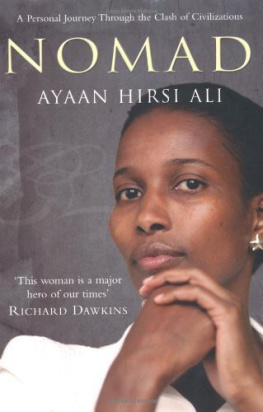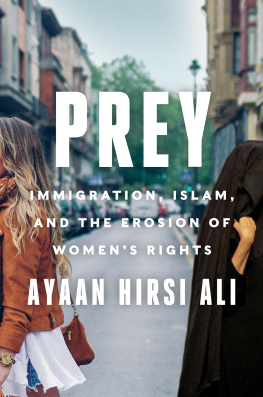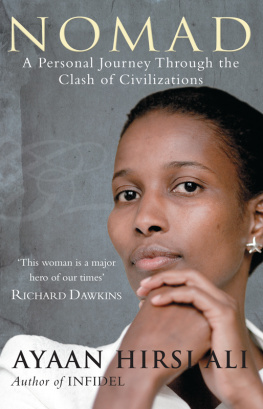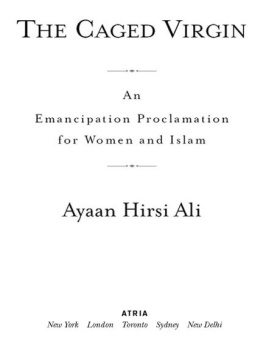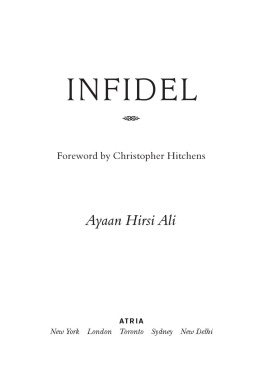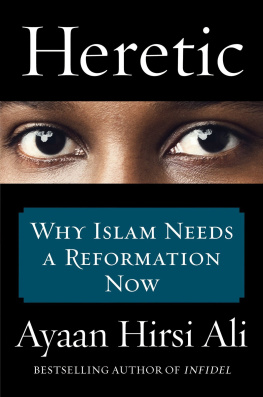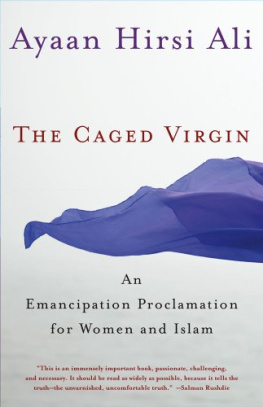Also by Ayaan Hirsi Ali
The Caged Virgin:
An Emancipation Proclamation for Women and Islam
Infidel
To Chris DeMuth, my surrogate abeh
a friend, a mentor, a guide to American life
with respect and love
Narrated Imran bin Husain:
The Prophet said, I looked at Paradise and found poor people forming the majority of its inhabitants; and I looked at Hell and saw that the majority of its inhabitants were women.
HadithSahih Bukhari 4:464
Contents
PART I
A PROBLEM FAMILY
PART II
NOMAD AGAIN
PART III
SEX, MONEY VIOLENCE
PART IV
REMEDIES
16.
Introduction
All my life I have been a nomad. I have wandered, rootless. Every place I have settled in, I have been forced to flee; every certainty I have been taught, I have cast aside.
I was born in Mogadishu, Somalia, in 1969. When I was very small my father was jailed for his role in the political opposition to the brutal dictatorship. Then he escaped from prison and fled into exile. When I was eight my mother took my siblings and me to Saudi Arabia to live with him. A year later we were expelled from Saudi Arabia and moved to Ethiopia, where my fathers opposition group was headquartered. After about eighteen months there, we moved again, to Kenya.
Every change of country threw me unprepared into whole new languages and sharply different habits of mind. Each time, I made a childs forlorn, often vain attempts to adapt. The one constant in my life was my mothers unbending attachment to Islam.
My father left Kenya, and us, when I was eleven. I didnt see him again until I was twenty-one. During his absence I had become a fervent and pious Muslim, under the influence of a schoolteacher. I also returned, for eight months, to Somalia, where I experienced the birth of the civil war and the chaos and brutality of the great exodus of 1991, when half the country was displaced and 350,000 people died.
When I was twenty-two my father ordered me to marry a relative, a stranger to me, who lived in Toronto, Canada. On my way from Kenya to Canada I was supposed to stop off in Germany, where I would pick up my visa to Canada and then continue my journey. Instead a kind of instinctive desperation prompted me to bolt. I took a train to Holland. This voyage was even more wrenching than the other journeys I had made, and my heart pounded with the implications of what I was doing and what my father and my clan would do when they discovered that I had run away.
In Holland I discovered the kindness of strangers. I was nothing to these people, and yet they fed and housed me, taught me their language, and allowed me to learn whatever I wanted to. Holland worked in a way that was different from any other country in which I had lived. It was peaceful, stable, prosperous, tolerant, generous, deeply good. As I learned Dutch I began to formulate an almost impossibly ambitious goal: I would study political science to find out why this society, although it appeared to me to be godless, worked when every society I had lived in, no matter how Muslim it claimed to be, was rotten with corruption, violence, and self-centered guile.
For a long time I teetered between the clear ideals of the Enlightenment that I learned about at university and my submission to the equally clear dictates of Allah that I feared to disobey. Working my way through university as a Dutch-Somali translator for the Dutch social services, I met many Muslims in difficult circumstances, in homes for battered women, prisons, special education classes. I never connected the dotsin fact I sought to avoid connecting the dotsso I could not see the connection between their belief in Islam and their poverty, between their religion and the oppression of women and the lack of free, individual choice.
It was, ironically, Osama bin Laden who freed me of those blinkers. After 9/11 I found it impossible to ignore his claims that the murderous destruction of innocent (if infidel) lives is consistent with the Quran. I looked in the Quran, and I found it to be so. To me this meant that I could no longer be a Muslim. In fact I realized then that I had not been a Muslim for a long time.
Speaking out about such matters, I began to receive death threats. I was also asked to run for the Dutch Parliament as a member of the free-market Liberal Party. When I became a member of Parliament, being young and black and femaleand often accompanied by a bodyguardI was very visible. But I was protected; my friends and colleagues were not. After the film director Theo van Gogh and I made a movie depicting how Islam crushes women, Theo was assassinated by a Muslim fanatic, a twenty-six-year-old man who had been born in Morocco and brought to Amsterdam by his parents.
I wrote a memoir, Infidel, about my experiences. I described how lucky I felt to have escaped places where people live in tribes and where the affairs of men are conducted according to the dictates and traditions of faith, how glad I was to live in a place where people of both sexes live equally as citizens. I related the random events that made my childhood so erratic; my mothers volatile temper; my fathers absence; the caprices of dictators; how we coped with diseases, natural disasters, and wars. I described my arrival in Holland and my first impressions of life in a place where people are not the subjects of tyrants or governed by the dictates of the clans bloodline but are citizens of governments they elect.
I touched onbut only touched onmy parallel and equally important mental journey. I described some of the questions that formed in my mind, the baby steps I took to make sense of the new world that I had entered, and the experiences that made me question my faith in Islam and the mores of my parents.
When I was writing Infidel I imagined that my travels were over. I thought that I was in Holland to stay, that I had taken root in its rich soil and would never have to uproot myself again. But I was wrong. I did have to leave. I came to Americalike many before mein search of an opportunity to build a life and a livelihood in freedom and in safety, a life that would be an ocean away from all the strife I had witnessed and the inner conflict I had suffered. This book, Nomad, explains why I chose America.
Readers of Infidel all over the world have offered me a great deal of support and encouragement. But they have also asked me a number of questions that I did not address in that book. They asked about the rest of my family. They asked about the experiences of other Muslim women. Time and again I heard the question: How typical was your experience? Are you in any way representative? Nomad answers that question. It is not only about my own life as a wanderer in the West; it is also about the lives of many immigrants to the West, the philosophical and very real difficulties of people, especially women, who live in a tightly closed traditional Muslim culture within a broadly open culture. It is about how Islamic ideals clash with Western ideals. It is about the clash of civilizations that I and millions of others have lived and continue to live.
When I moved to the United States and began again the process of anchoring myself in a new country, I was assailed by a new and intense homesickness that followed the death of my father in London. Reconnecting with my extended familycousins and my own half sisterwho live in the United States, the UK, and elsewhere, I found them tragically unsteady on their feet. One has AIDS, another has been indicted for attempting to murder her husband, and a third sends all the money he makes back home to Somalia to feed the clan. They all claim to be loyal to the values of our tribe and of Allah. They are permanent residents and citizens of the Western countries where they live, but their hearts and minds lie elsewhere. They dream of a time in Somalia that never existed: a time of peace, love, and harmony. Will they ever take root where they are? It seems unlikely. My discovery of their troubles is one of the subjects of
Next page
